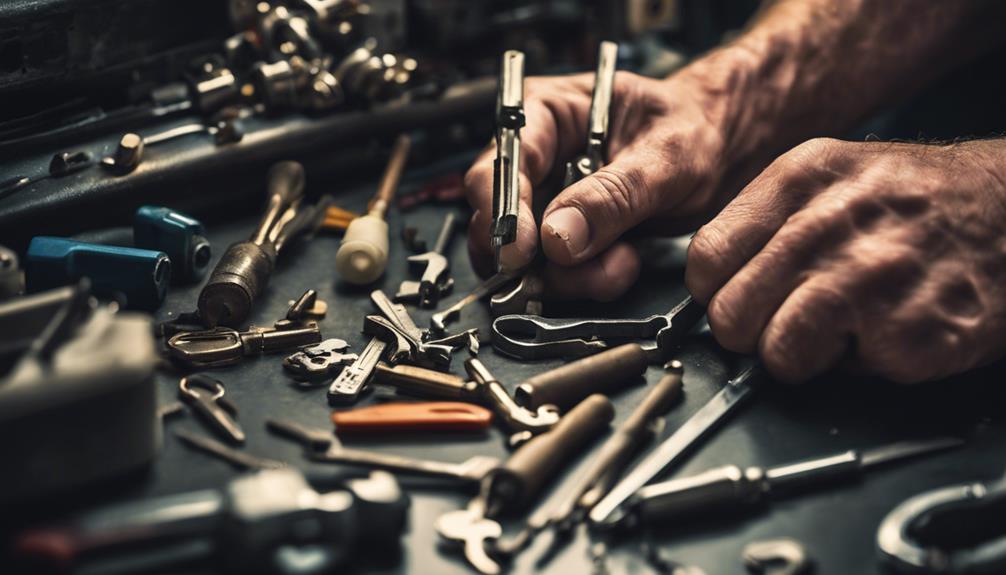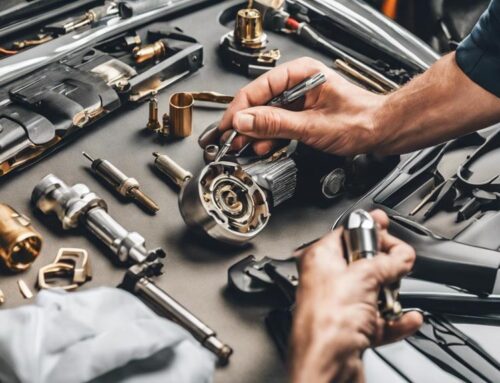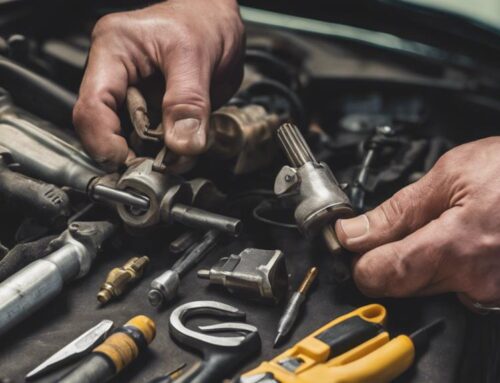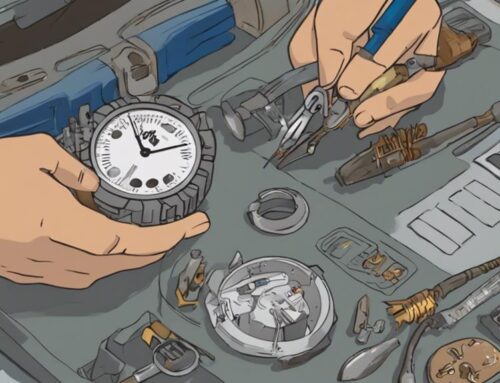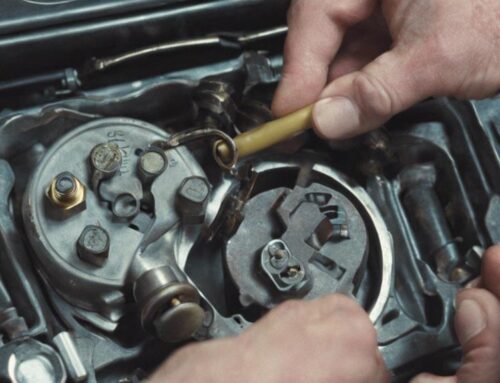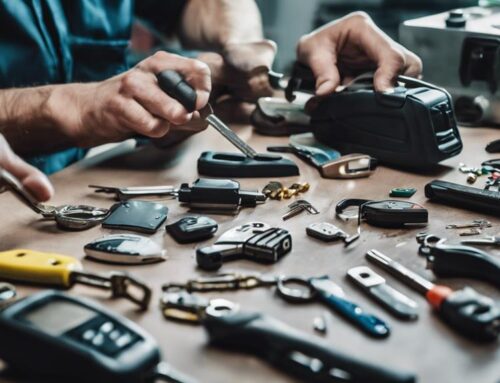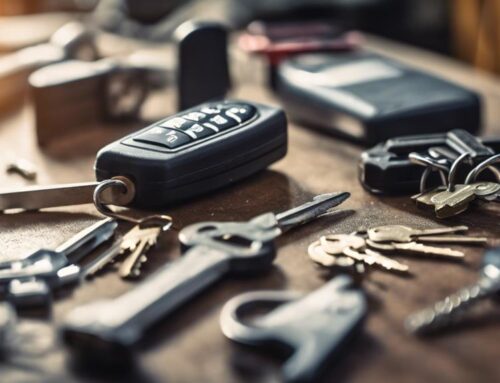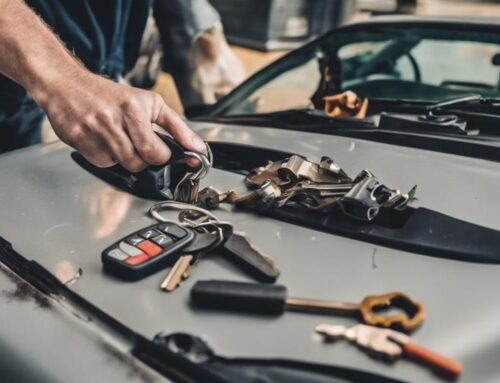When a key decides to take an unexpected vacation inside your lock, it can be a real headache. You might wonder if a locksmith can extract that broken piece without causing further chaos to your lock or ignition. Fortunately, skilled professionals have the tools and techniques to handle such situations delicately. But what exactly does this process involve, and how do you know when it's time to call in the experts? Understanding these aspects could save you from unnecessary stress and expenses in the future.
Key Takeaways
- Skilled locksmiths use specialized tools to extract broken keys, minimizing the risk of damaging the lock or ignition.
- Proper techniques, such as the "hook and pull" method, ensure careful handling of key fragments during extraction.
- Regular training and experience with various lock types equip locksmiths to maintain lock integrity during key removal.
- Locksmiths assess the extent of breakage before extraction to avoid causing further damage to the locking mechanism.
- Utilizing lubrication during the extraction process helps ease removal and protects the internal components of the lock.
Understanding Broken Key Situations
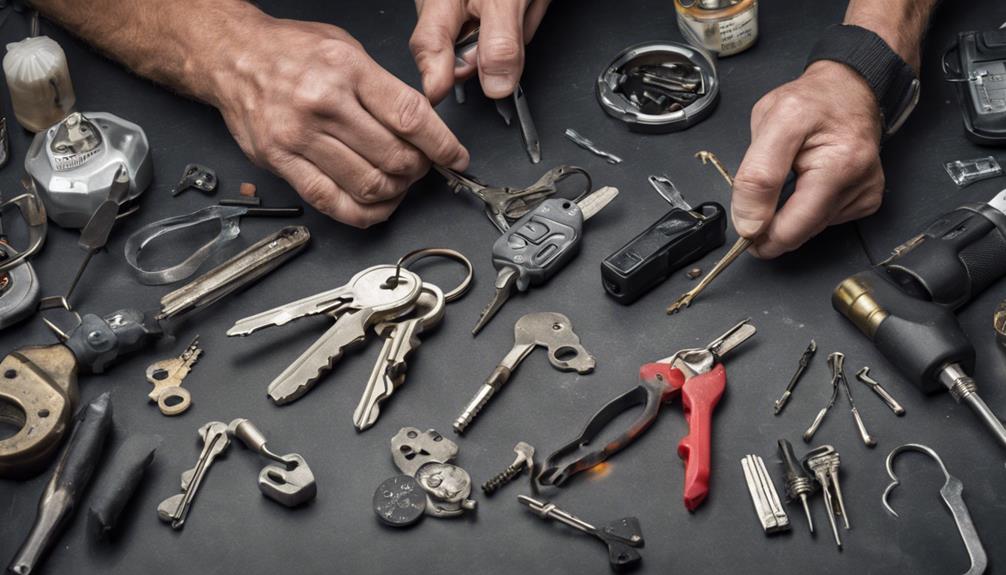
Have you ever found yourself in a situation where a key snapped off in a lock? This can be frustrating, especially considering the various key types and their specific vulnerabilities. Factors contributing to a break might include wear from inadequate key maintenance, such as neglecting lubrication or excessive force during operation. Understanding the mechanics behind your lock can empower you to take preventative measures. Regularly inspect your keys for signs of wear, and replace them when necessary to avoid unexpected failures. Additionally, familiarize yourself with the lock's design; some mechanisms are more prone to issues than others. By being proactive, you'll reduce the likelihood of encountering a broken key situation, ensuring your access remains uninterrupted. Locksmiths have the expertise to handle broken key extractions professionally, with specialized tools and techniques that can safely remove the key without causing damage to the lock or ignition.
Tools Used by Locksmiths
When a key breaks in a lock, the right tools can make all the difference in successfully extracting it without causing damage. Professional locksmiths rely on specialized locksmith tools tailored for extraction techniques. A tension wrench provides the necessary torque to hold the lock in place, while a hook extractor allows you to grip the broken key fragment securely. Additionally, a broken key extractor tool, designed with precision, can slide into the lock to retrieve the key without harming the internal mechanisms. Other essential tools include lubrication sprays that ease the extraction process and help prevent further damage. By utilizing these tools effectively, a locksmith can achieve a clean extraction, preserving your lock's integrity and functionality. Locksmiths also use Essential Tools for Extracting Broken Car Keys to address specific challenges with transponder systems and high-security vehicles.
Techniques for Safe Extraction
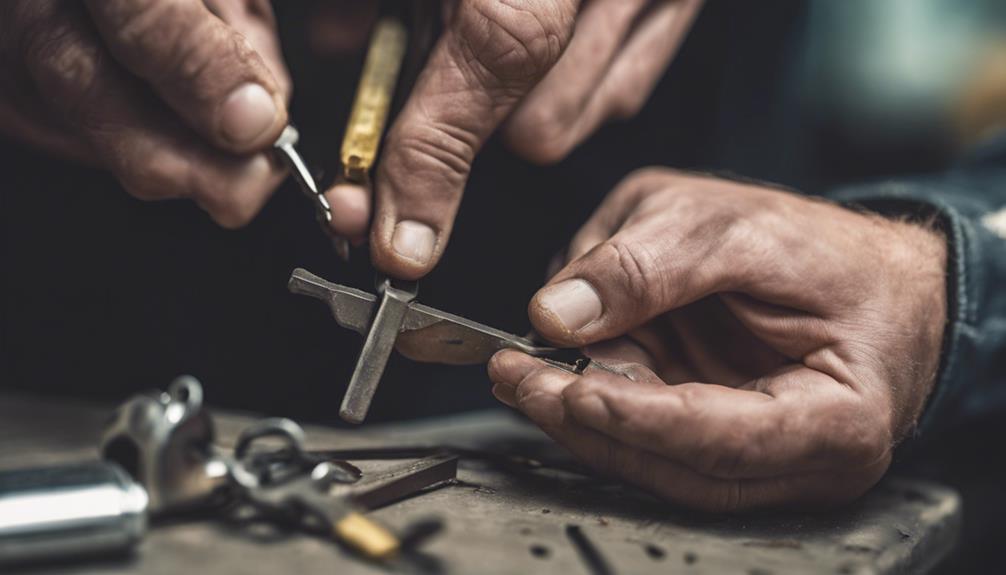
When you encounter a broken key, using the right extraction tools is vital for a safe removal. You'll want to follow a step-by-step process to guarantee minimal damage to the lock. Understanding these techniques can help you effectively address the situation without unnecessary complications.
Extraction Tools Used
To safely extract a broken key from a lock, locksmiths rely on specialized tools designed for this precise task. These extraction tools include key extractors, which feature finely serrated edges to grip the broken key securely. Additionally, locksmiths may use slide hammers, providing mechanical advantage for removing stubborn pieces. Tension wrenches can also be employed to relieve pressure on the lock, facilitating smoother extraction. Some locksmiths utilize extraction techniques like the "hook and pull" method, enabling them to navigate tight spaces with precision. Each piece of specialized equipment enhances their ability to perform the extraction without damaging the lock or ignition. By mastering these tools and techniques, locksmiths guarantee efficient and safe key removal. In emergency situations, locksmiths offer 24/7 services, guaranteeing prompt assistance for individuals facing broken key issues, as outlined in the availability of 24/7 locksmith services.
Step-by-Step Process
Extracting a broken key from a lock requires a systematic approach to guarantee safe removal without causing damage. First, assess the lock to understand the extent of the breakage. Use a pair of needle-nose pliers or a specialized key extraction tool for grip. Insert the tool into the lock, making certain it engages with the broken key fragment. Next, apply gentle, steady pressure to pull the key out slowly; avoid yanking to prevent further damage. If this fails, consider utilizing a hook tool or a broken key extractor for precision. Throughout the process, maintain a clear focus on the lock's integrity. Mastering these locksmith techniques guarantees effective key extraction while preserving the lock's functionality.
Risks of Improper Extraction
Improper extraction of a broken key can lead to significant risks, not just to the lock itself but also to your overall security. When you attempt to remove a key without the proper technique, you increase the likelihood of lock damage. This can result in misalignment or even complete failure of the locking mechanism. Furthermore, if shards remain inside, they can compromise the integrity of the lock, making it easier for intruders to bypass your security measures. Additionally, you might find yourself facing costly repairs or replacements, impacting your budget and peace of mind. To mitigate these risks, always rely on a skilled locksmith who understands the intricacies of lock systems and can execute the extraction efficiently.
Signs You Need a Locksmith
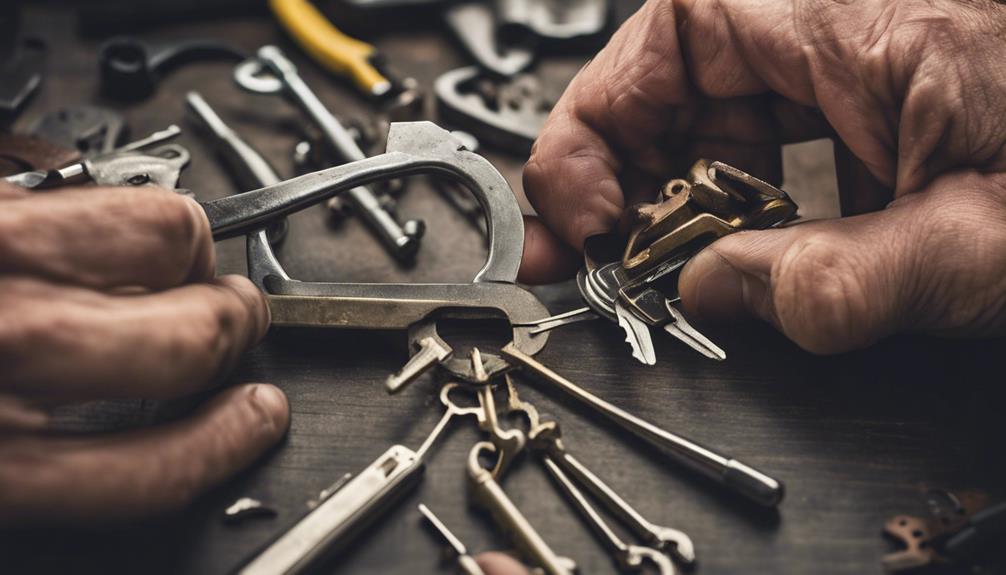
If you're experiencing difficulty turning your key, it's a clear sign that something's wrong. Additionally, if you notice key fragments stuck inside the lock, or if the lock mechanism isn't functioning properly, it's time to call a locksmith. Addressing these issues promptly can prevent further damage and guarantee your security.
Difficulty Turning the Key
Experiencing difficulty turning the key can signal underlying issues with your lock or key. When this happens, it's important to address the problem promptly. Consider these potential causes:
- Key Tension: Excessive force while turning can bend the key or cause wear. If the key is bent, a locksmith can extract the broken key without damaging the lock using specialized tools.
- Lock Alignment: Misalignment of the lock mechanism can prevent smooth operation.
- Debris: Dust or foreign objects inside the lock could hinder movement.
- Worn Components: Over time, internal parts may degrade, impacting functionality.
If you're facing any of these issues, don't hesitate to contact a locksmith. They possess the expertise to diagnose and resolve the problem without damaging your lock or ignition, ensuring you regain control with minimal hassle.
Key Fragments Inside Lock
Key fragments lodged inside a lock can create significant inconvenience and signal the need for professional help. If you notice difficulty inserting or turning your key, it's likely due to broken pieces obstructing the mechanism. Different key types, like transponder or traditional keys, can be more susceptible to damage, emphasizing the necessity of proper key maintenance. Regular inspections can prevent wear and tear that may lead to breakage. If you suspect key fragments are stuck, don't attempt to extract them yourself, as this could worsen the situation. Instead, contact a skilled locksmith who can safely remove the fragments without damaging your lock. Act promptly to maintain your security and restore your access efficiently.
1. It's important to be cautious when dealing with broken key fragments, as improper handling can cause further damage. Seeking professional assistance guarantees a safe and effective extraction process.
Lock Mechanism Malfunctioning
A malfunctioning lock mechanism can leave you feeling vulnerable and frustrated. Recognizing the signs is essential for your security. Here are four indicators you need a locksmith:
- Difficulty Turning the Key: If you struggle to insert or turn your key, this often points to internal wear.
- Unusual Noises: Grinding or clicking sounds during operation signal mechanical issues.
- Lock Sticking: Persistent sticking can indicate a lack of lock maintenance or damaged components.
- Key Durability Issues: If your keys frequently break, it may suggest a deeper lock problem.
Addressing these signs promptly guarantees effective lock maintenance, preserving your lock's integrity and enhancing key durability. Don't wait for a complete failure; act decisively to protect your assets.
Low Rate Locksmith's Expertise
Low-rate locksmiths possess the expertise needed to efficiently extract broken keys without causing damage to your locks. Their locksmith training equips them with the fundamental skills required for precise key extraction. With significant extraction experience, they can tackle various lock types, ensuring that the integrity of your lock remains intact throughout the process. Utilizing specialized tools and techniques, these professionals assess the situation quickly, determining the best approach to remove the key fragment. You can trust that a skilled low-rate locksmith will execute the extraction with minimal risk of further complications. By choosing a locksmith with a proven track record, you empower yourself to resolve key-related issues effectively, safeguarding your property without incurring unnecessary expenses. Additionally, they stay updated on the latest advancements in key extraction methods to provide efficient services Mastering Car Key Extraction: Tips for Every Lock Type.
Preventing Future Key Breakage
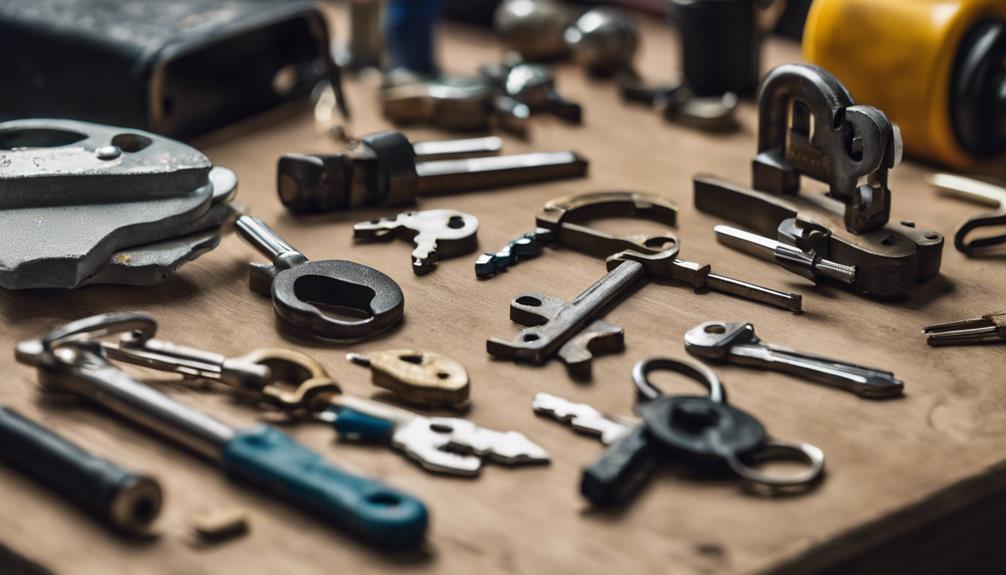
Your locks' longevity can greatly depend on how you care for and handle your keys. To prevent future key breakage, implement these key maintenance tips:
- Inspect Regularly: Check keys for signs of wear or damage. Replace them promptly. Remember, prevention is key to avoiding costly key extraction situations.
- Use Lubrication: Apply graphite or silicone lubricant to your locks to reduce friction, avoiding wear.
- Don't Force It: If a key doesn't turn smoothly, don't force it. Investigate the issue before attempting again.
- Limit Keychain Weight: Avoid overloading your keychain, which can create unnecessary stress on keys.
Cost of Key Extraction Services
Considering the potential complexities involved, the cost of key extraction services can vary considerably based on several factors. Typically, key extraction costs depend on the lock's type, the key's location, and the time required for extraction. Standard service pricing for residential locks may range from $50 to $150, while automotive services can escalate to $100 or more, particularly if the ignition system is affected. Additional charges might arise from emergency call-outs or after-hours services. It's crucial to obtain detailed estimates before proceeding, as transparency in pricing can save you from unexpected expenses. Ultimately, investing in professional extraction guarantees your lock's integrity remains intact, which could prevent further costly issues down the line. Locksmiths are skilled in such delicate procedures, ensuring a smooth and reliable key extraction process.
Choosing the Right Locksmith

When it comes to choosing the right locksmith for key extraction, it is essential to prioritize experience and expertise. Not all locksmiths are created equal, so make sure you select one with the right credentials. Here's what to take into account:
- Locksmith Qualifications: Verify their certifications and training in key extraction techniques. It's important to choose a locksmith who has the necessary skills to handle delicate situations like key extraction, as highlighted in a post about car key replacement on illchangethislater.
- Experience: Look for a locksmith with a proven track record in similar situations.
- Customer Reviews: Check online testimonials to gauge satisfaction and reliability.
- Insurance: Confirm they're insured to protect against potential damages during the extraction process.

